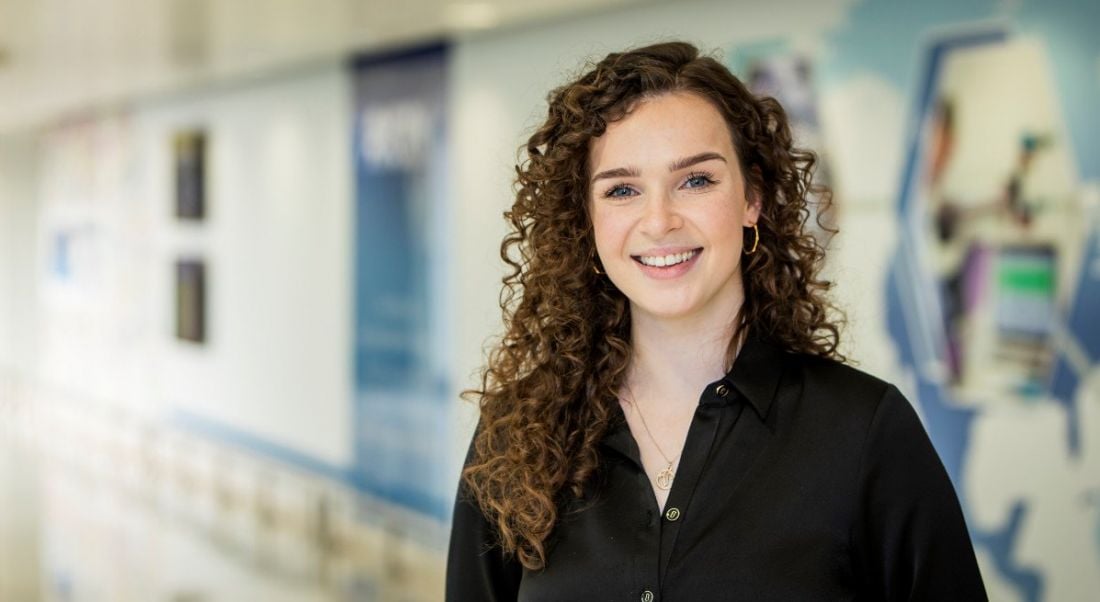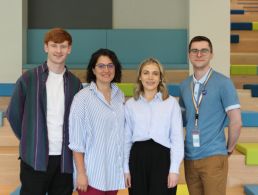If you’re considering a career in pharma after finishing college, Veronica Boomsma of Amgen says a graduate programme can be an ‘ideal way’ to find your footing.
Before starting the Amgen graduate programme, Veronica Boomsma studied industrial biochemistry at the University of Limerick. Now that she’s a year into the programme, she reflects on her time at the company so far.
‘We are given just as much responsibility as other employees in similar roles’
– VERONICA BOOMSMA
With this programme, are you now working in your desired industry?
Definitely. Leaving university with a degree in industrial biochemistry meant that a career in the pharmaceutical industry was a suitable choice that the graduate programme has allowed me to pursue. It is an industry that is continuously evolving, with innovation at its core. This allows for some exciting opportunities for students at the culmination of their college degrees.
What drew you to Amgen when you were seeking work as a graduate?
There are a number of criteria that I looked at when searching for work during my final year of university. These included the prospective career growth that I could achieve in a company, the emphasis they place on their patients and expansion in the industry and their reputation in the pharma field. Amgen ticked these boxes for me.
Upon doing some further research into the company, I was impressed with their core values of being science-based, ethical and patient-driven and with the culture of innovation that permeates through the company.
Ultimately, my decision to apply for a job with Amgen came down to the fact that they matched my criteria while also having a programme that specifically catered to graduates.
What expectations did you have before you began the programme?
One aspect of the interview process allowed candidates to ask any pertinent questions that they may have. As a result, I had a relatively clear perception of what the graduate programme would entail. I expected there to be a rotational aspect to the programme’s layout, so that each of the graduates could work in various departments. I expected there to be a steep learning curve.
In order to boost your experience in the programme, it is necessary gain as many skills and soak up as much knowledge as possible in each area before moving on to the next. A high degree of expectation was placed on each of us from the get-go, which facilitates a great learning environment.
What duties and responsibilities were you given initially?
By the end of my first week in Amgen, I was assigned a project to work with the plant quality assurance (PQA) team on the annual inspection of the sites’ reserve samples. My second week was spent training on the visual inspection of lyophilised vials and the identification of defects. This was later expanded to the inspection of syringes.
My work on this project occupied the vast majority of my time from September through to December. The scope of the project included a variety of responsibilities, ranging from obtaining the reserve samples from Amgen’s storage system and physically inspecting the vials and syringes, to submitting any defective samples to process development for forensic testing.
Did the scope of your work change as the programme progressed?
Yes, the scope of my work has changed considerably since I first began. The reserve-inspection project had occupied all of my time in the initial months of the programme, which meant that once it reached its conclusion, my responsibilities were altered entirely.
I then began to focus more on tasks and projects based in incoming quality assurance (IQA) and began training on processes that my colleagues regularly use.
Can you describe a typical day in your role?
It’s difficult to describe a typical day as each day usually presents new challenges. My standard day would usually start with a morning meeting with the IQA team. I would then often be found pulling reserve samples from the Amgen storage system for the PQA or inspection departments.
The rest of my day could consist of processing incoming materials, working on any projects that I have and attending meetings. A lot of the work done in the IQA department is based in problem-solving. We encounter issues every day that need our attention, which generally keeps thing interesting.
How do your responsibilities compare to more experienced employees’?
One of the most beneficial parts of the graduate programme is the fact that we are given just as much responsibility as other employees in similar roles. We are provided with training and support on any queries, given that we are new to the industry. However, we are expected to perform to a certain standard. This is excellent as it forces us to learn quickly, becoming a valued member of the team.
Do you feel more prepared for working life after entering this programme?
As of now, I have completed 12 months of the Amgen graduate programme. However, I definitely feel as though it has already had a positive impact in preparing me for work following the two-year programme. The skills that I have developed and the people that I have met have already had a positive impact on my career.
Why should someone apply to the Amgen graduate programme?
I feel as though a graduate programme is the ideal way for graduates to find their footing in their respective industries. It is a way for individuals to hone the skills and knowledge that they have been cultivating throughout college and during their internships, while also gaining new knowledge and developing a deeper understanding of their fields.
The Amgen graduate programme is particularly enticing in this regard as it allows its participants to try various areas within each department to figure out what their best fit is for a career beyond the two years.




